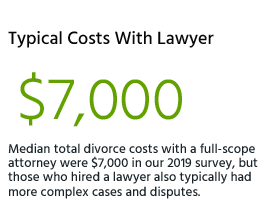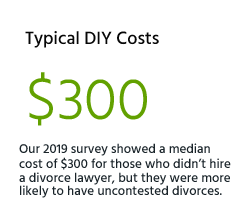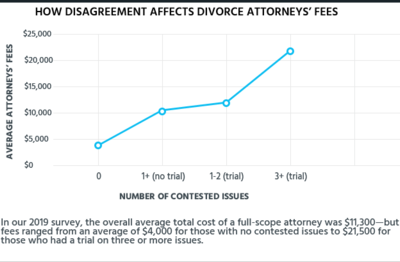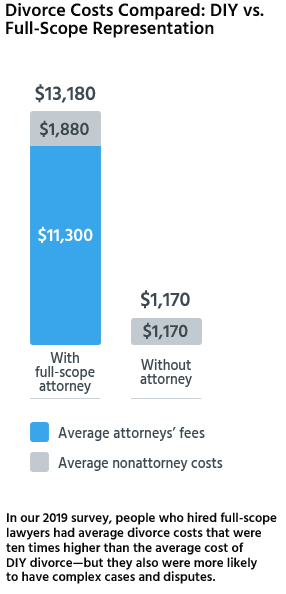A real-world guide to typical divorce costs, the factors that make some divorces more expensive than others, and what you can do to lower the cost of your own divorce.


If you're like most people facing the end of a marriage, you're probably anxious about all of the unknowns ahead. One of those unknowns is the expense of getting divorced.
The final cost of your divorce will depend largely on your unique circumstances—as well as some important choices you make. So it's almost impossible to predict how much you'll pay without knowing the details.
Still, it is possible to provide a clear picture of typical costs under some common scenarios, as well as the factors that can raise or lower those costs.
What Makes Divorce More or Less Expensive?
Many different factors affect how much your divorce will cost. But the biggest cost differences hinge on the answers to three questions:
- Will you hire a lawyer? If you decide to hire a lawyer, your biggest divorce expense will be your lawyer's bill. So if you're looking to cut costs, your first instinct might be to skip the attorney and handle the divorce on your own. The choice of a DIY divorce versus hiring a lawyer will depend on your circumstances—especially the answers to the next two questions.
- Do you and your spouse have kids or complex finances? Divorces are typically more complicated—and more expensive—when they involve issues such as child custody, child support, alimony, and how to divide property and debts.
- Can you and your spouse agree on the issues in your divorce? You can save a lot of money if the issues in your case are fairly simple and you can reach a settlement agreement on those issues. When divorcing spouses agree, lawyers might not be necessary. And if you do hire a lawyer, the cost will largely depend on the number of contested issues in your case and whether you have to go to trial to resolve those issues (more on that below).
How Much Does a Divorce Lawyer Cost?


When you look into hiring a divorce lawyer, the first price tag you'll probably encounter is the attorney's hourly rate. In 2019, we surveyed our readers who had recently been through a divorce. Our readers reported that the average rate they paid their attorneys was $270 an hour. We also conducted a separate study of hourly rates charged by family lawyers around the country, which showed that typical rates in 2019 varied from about $200 to over $300 per hour—and even more for experienced family law attorneys in large metropolitan areas.
Average hourly rates are likely to be higher now. According to Clio, a legal technology company, the national average hourly rate for family law attorneys in 2023 was $312. Rates tend to be higher than the national average in high-population states like New York ($397) and California ($384) and lower than average in smaller states like West Virginia ($258) and Maine ($254).
The total amount of your bill, of course, will depend not only on your lawyer's hourly rate but also on the number of hours needed for your case. How many hours your case requires depends on many factors—especially the complexity of your case and your ability to reach a settlement with your spouse on the issues.
How Case Complexity Affects the Need for a Lawyer
In our 2019 survey, most of the readers who hired divorce lawyers had the attorneys handle their entire case—what's known as "full-scope" representation.
In our survey, 75% of readers with four or more contested disputes (on issues like child custody, spousal support, and division of property) hired full-scope attorneys. Just over 50% of readers with one contested issue hired a full-scope attorney, compared with around 33% of those with no contested issues.
Also, regardless of the number of contested issues, people who owned houses or businesses with their spouses were more likely to hire full-scope lawyers than people who didn't have these types of assets to divide in the divorce. (See more detailed survey results on when people hire divorce lawyers.)
Full-scope representation isn't cheap. The readers we surveyed in 2019 paid an average of $11,300 in attorneys' fees. The median amount—the middle of the range, where half paid less and half paid more—was $7,000.
But it's worth noting that when it comes to hiring a divorce attorney, full-scope representation isn't the only option, even if it's the most common approach. Depending on your situation, you might be able to save on your legal costs by hiring a consulting attorney to handle limited tasks in your divorce (more on this option below).
How Disputes and Going to Trial Affect Lawyer Cost
But overall averages are only part of the picture. Two factors make a huge difference in attorneys' fees: the number of contested issues in the divorce, and whether couples reach a settlement or go to trial on those issues. Consider this:
- In our 2019 survey, average fees for readers who didn't go to trial ranged from a low of $4,000 (for those who reported no disputes over the major issues in their divorce) to $10,400 (for those who had at least one contested issue at the outset but reached a settlement on all issues).
- The bills were much higher for those who went to trial in their divorce: an average of $11,600 for trial on one or two issues and $21,500 average for trial on three or more issues. Some readers in our survey reported paying as much as $75,000 in fees after trial on multiple issues.
Beyond Attorneys' Fees: Other Divorce Expenses
With or without a lawyer, you'll have to pay some basic court fees, and you might have added costs for mediation (both of which are discussed below). But because people who hire lawyers are more likely to have complex cases, they're also more likely to have other expenses, such as:
- real estate appraisals (for instance, when one spouse wants to keep the family home)
- tax experts (for advice on the tax consequences of agreements on issues like property division and alimony)
- "QDRO" experts (for preparing orders to divide retirement accounts)
- child custody evaluations (covered above)
- vocational evaluations (often required when there's a request for alimony), and
- forensic accountants (to find assets that a spouse might be hiding).
Case complexity is probably why our 2019 survey showed that readers with full-scope attorneys paid more for these sorts of costs (an overall average of $1,880) than those who handled their own divorce ($1,170, on average).
How Much Does a Do-It-Yourself or Online Divorce Cost?


Of course, not everyone wants (or can afford) to hire a divorce lawyer. You can choose a DIY divorce or file for divorce online.
Do-It-Yourself Divorce
If you go the DIY route, you'll need to know:
- where to file your divorce (that is, the county where you meet the residency requirement)
- how to get all the right forms
- how to complete them properly, and
- how to file them with the court (typically online).
Depending on the laws in your state, you'll probably also have to complete and exchange financial disclosure forms with your spouse. Some states have self-help centers (through the court system or legal aid organizations) that provide information or even online instructions for the process.
If DIY is the right choice for your situation, there's no doubt that it will cost much less than hiring a full-scope divorce lawyer. On average, the readers in our 2019 survey who handled their own divorce paid a total of $1,170 in costs. The more typical cost—the median amount—was only $300.
About half of those who didn't hire a lawyer had no contested issues in their divorce. When you handle an uncontested divorce on your own, your main expense will probably be the court's filing fee for the divorce petition or response. These fees vary from state to state—and even from county to county in some states—ranging from about $100 to over $400. If you can't afford the filing fees where you live, you can usually apply for a fee waiver from the court.
You might also have to pay other fees to:
- hire a process server to serve your spouse with the divorce paperwork
- file other documents in your case, and
- obtain a certified copy of the divorce decree.
In some states, you may file a joint petition with your spouse for an uncontested divorce—which means you could split the filing fee. Certain states also offer special, simplified procedures for an uncontested divorce, but they often have strict requirements. (Learn about state laws on uncontested divorce.)
Online Divorce Services
Online divorce is an increasingly popular option for divorcing couples who have agreed about custody, support, and the division of property and debts. Instead of having to find and fill out all of the divorce forms that apply to your situation, an online divorce service will have you answer questions about your situation and then generate the proper, completed forms needed for an uncontested divorce in your state. Some of the more expensive services will file the forms for you. Others provide you with filing instructions and guarantee that your state court will accept the completed forms. The cost of online services varies, but it's typically in the $150 to $750 range.
Other Ways to Lower Divorce Costs
As should be clear by now, there's a wide range of divorce costs. The best way to keep expenses down is for you and your spouse to agree—without a lawyer's help—on the legal issues related to the end of your marriage, from splitting up your possessions to the arrangements for parenting and financial support.
But what if your differences are just too great, or if your soon-to-be ex refuses to compromise? Not surprisingly, the same communication problems and emotional conflicts that spelled the end of a marriage often make the divorce process itself difficult. You might have little choice in that situation but to hire a lawyer. That's also the case if your spouse already has a divorce attorney—which would put you at an unfair disadvantage if you don't have legal representation. (If you don't think you can afford to hire a lawyer, it might help to know that most states allow judges to order one spouse to contribute to the other's attorneys' fees, especially if there's a big difference in their incomes.)
With or without a lawyer, however, there are ways to bring down the cost of your divorce, including mediation, collaborative divorce, and using a consulting attorney.
Mediation or Collaborative Divorce
If you and your spouse can work out your disagreements through mediation or collaborative divorce, you will save the considerable expense of going to trial.
The cost of divorce mediation itself can vary considerably, depending on whether it's with a private mediator or through the court or a nonprofit agency, as well as the number of issues you need to work out. Regardless, mediation will almost certainly be less expensive than collaborative divorce (which involves paying two lawyers rather than splitting the cost of one mediator). That's true even if you hire a private mediator, and even if you consult with a lawyer during the mediation process.
Using a Consulting Attorney
If you're confident that you can handle the divorce without a full-scope lawyer (or you simply can't afford that option), you could save on attorneys' fees by using what's often referred to as "unbundled" legal services or "limited-scope representation"—paying a lawyer to handle only certain tasks or to give advice on specific questions.
For example, you might hire a lawyer to help you prepare for mediation, coach you during negotiations, or prepare a formal settlement document. At the very least, it's usually wise to have a lawyer review a settlement agreement you've drafted to make sure it's fair and covers everything that needs to be addressed.
Of course, the cost of working with a consulting attorney will vary widely, depending on how many hours of the lawyer's services you need. In our 2019 survey, readers who worked with a consulting attorney or used unbundled legal services in their divorce paid an average of $4,600 in attorneys' fees. The more typical median cost was $3,000.
If you're not sure which route to take with your divorce, you can take our free divorce quiz. It'll give you feedback on whether DIY divorce, mediation, or hiring an attorney is appropriate in your situation.
The survey results mentioned in this article came from Martindale-Nolo Research's 2019 divorce survey, which analyzed responses from readers who had recently gone through a divorce and had voluntarily provided their email when they researched hiring a lawyer. All collected data is kept confidential and complies with Nolo's privacy policy. References to attorney reports of fees and billing practices are based on a database of attorneys who claimed their profiles on Avvo.com and provided information about their practice. Nolo carefully examined and analyzed the data using sound statistical methods. The Nolo survey project aims to promote transparency and clarity about the legal process.